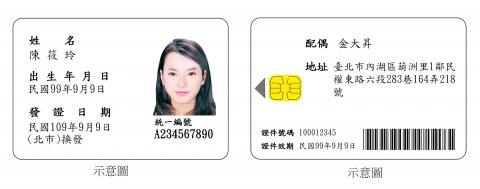New national identity cards with integrated chips proposed by the Ministry of the Interior will not incorporate biometric data, due to information security concerns, Minister of the Interior Yeh Jiunn-rong (葉俊榮) said.
The ministry had initially proposed incorporating retinal or fingerprint scan data into the cards to assist government efforts to digitize records and services, but using biometrics would only be possible with a general consensus from the public, Yeh said, adding that achieving such a consensus was unlikely.
“I personally do not support the incorporation of biometrics into identity cards ... [the system] is just not suitable for Taiwan,” he said.

Photo: Provided by the Ministry of the Interior
Department of Household Registration Affairs Director Wanda Chang (張琬宜) said that even with public support, the department would not use biometrics.
The new cards will have the ability to incorporate personal identity verification data, which would be independent of the individual’s personal records, but the function would need to be turned on by cardholders, she said.
The ministry has strict plans to protect privacy and ensure information security, she added.
The new cards would move some information onto the chip to reduce the card’s size, such as the names of the user’s parents, which are printed on current identification cards, Chang said.
However, spousal information would still be printed on the back of the new cards, she added.
The integrated chip is to support active and passive authentication, as well as basic and assisted access functionality, Chang said, adding that they would have laser etchings on the surface to prevent forgery and modification.
Assisted access functionality would require users to enter personal passwords, she said.
National Chiao Tung University computer science professor Lin Ying-ta (林盈達) said the cards should be as small and simple as possible to limit damage in the worst-case scenario of the system being hacked.
National Cheng Kung University Department of Electrical Engineering professor Lee Chung-hsien (李忠憲) said the ministry is taking the right design direction by not incorporating biometric information.
He said spousal information should also be removed from the cards.
“There are a lot of people in modern society who remain single or are divorced. This private information should be protected,” Lee said.
Taiwan Association for Human Rights chairman Weng Kuo-yan (翁國彥) said that despite the ministry omitting biometrics, the design of the new cards must still be carefully examined by the Legislative Yuan before its details are finalized.
Personal information will still be stored on the card, regardless of its simplification, and information security concerns must therefore be scrutinized, he said.

INVESTIGATION: The case is the latest instance of a DPP figure being implicated in an espionage network accused of allegedly leaking information to Chinese intelligence Democratic Progressive Party (DPP) member Ho Jen-chieh (何仁傑) was detained and held incommunicado yesterday on suspicion of spying for China during his tenure as assistant to then-minister of foreign affairs Joseph Wu (吳釗燮). The Taipei District Prosecutors’ Office said Ho was implicated during its investigation into alleged spying activities by former Presidential Office consultant Wu Shang-yu (吳尚雨). Prosecutors said there is reason to believe Ho breached the National Security Act (國家安全法) by leaking classified Ministry of Foreign Affairs information to Chinese intelligence. Following interrogation, prosecutors petitioned the Taipei District Court to detain Ho, citing concerns over potential collusion or tampering of evidence. The

‘FORM OF PROTEST’: The German Institute Taipei said it was ‘shocked’ to see Nazi symbolism used in connection with political aims as it condemned the incident Sung Chien-liang (宋建樑), who led efforts to recall Democratic Progressive Party (DPP) Legislator Lee Kun-cheng (李坤城), was released on bail of NT$80,000 yesterday amid an outcry over a Nazi armband he wore to questioning the night before. Sung arrived at the New Taipei City District Prosecutors’ Office for questioning in a recall petition forgery case on Tuesday night wearing a red armband bearing a swastika, carrying a copy of Adolf Hitler’s Mein Kampf and giving a Nazi salute. Sung left the building at 1:15am without the armband and apparently covering the book with a coat. This is a serious international scandal and Chinese

Seventy percent of middle and elementary schools now conduct English classes entirely in English, the Ministry of Education said, as it encourages schools nationwide to adopt this practice Minister of Education (MOE) Cheng Ying-yao (鄭英耀) is scheduled to present a report on the government’s bilingual education policy to the Legislative Yuan’s Education and Culture Committee today. The report would outline strategies aimed at expanding access to education, reducing regional disparities and improving talent cultivation. Implementation of bilingual education policies has varied across local governments, occasionally drawing public criticism. For example, some schools have required teachers of non-English subjects to pass English proficiency

TRADE: The premier pledged safeguards on ‘Made in Taiwan’ labeling, anti-dumping measures and stricter export controls to strengthen its position in trade talks Products labeled “made in Taiwan” must be genuinely made in Taiwan, Premier Cho Jung-tai (卓榮泰) said yesterday, vowing to enforce strict safeguards against “origin laundering” and initiate anti-dumping investigations to prevent China dumping its products in Taiwan. Cho made the remarks in a discussion session with representatives from industries in Kaohsiung. In response to the US government’s recent announcement of “reciprocal” tariffs on its trading partners, President William Lai (賴清德) and Cho last week began a series of consultations with industry leaders nationwide to gather feedback and address concerns. Taiwanese and US officials held a videoconference on Friday evening to discuss the